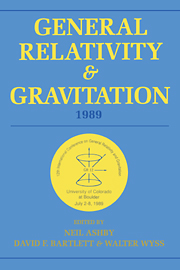 General Relativity and Gravitation, 1989
General Relativity and Gravitation, 1989 Book contents
- Frontmatter
- Contents
- Preface
- Conference committees
- Part A Classical relativity and gravitation theory
- WORKSHOPS
- Part B Relativistic astrophysics, early universe, and classical cosmology
- WORKSHOPS
- Part C Experimental gravitation and gravitational wave detection
- 10 Experimental tests of the universality of free fall and of the inverse square law
- 11 Resonant bar gravitational experiments
- 12 Solar system tests of general relativity: recent results and present plans
- 13 Interferometric gravitational wave detectors
- WORKSHOPS
- Part D Quantum gravity, superstrings, quantum cosmology
- WORKSHOPS
- Part E Overviews-past, present, and future
10 - Experimental tests of the universality of free fall and of the inverse square law
Published online by Cambridge University Press: 05 March 2012
- Frontmatter
- Contents
- Preface
- Conference committees
- Part A Classical relativity and gravitation theory
- WORKSHOPS
- Part B Relativistic astrophysics, early universe, and classical cosmology
- WORKSHOPS
- Part C Experimental gravitation and gravitational wave detection
- 10 Experimental tests of the universality of free fall and of the inverse square law
- 11 Resonant bar gravitational experiments
- 12 Solar system tests of general relativity: recent results and present plans
- 13 Interferometric gravitational wave detectors
- WORKSHOPS
- Part D Quantum gravity, superstrings, quantum cosmology
- WORKSHOPS
- Part E Overviews-past, present, and future
Summary
Recent suggestions of a “fifth force” have stimulated many experiments to search for new macroscopic interactions arising from the exchange of ultra-low mass fundamental bosons. The experiments fall into two categories: searches for violation of the inverse square law, or of the universality of free fall. The principles of both classes of experiments are described and their results are summarized. Because some groups claim positive effects considerably larger than the upper limits established by others, subtle systematic errors that could masquerade as a “fifth force” are briefly discussed. I conclude that there is, at present, no credible evidence for new macroscopic interactions.
Introduction
One feature common to essentially all extensions of the standard model is the prediction of additional fundamental scalar or vector bosons. While these particles are ordinarily expected to be very massive (mbc2 > 1015 eV), the possibility that some have them have such a low mass, mbc2 < 10−3 eV, that they produce macroscopic forces between unpolarized test bodies, has been considered in a variety of contexts. For example, such speculations have been inspired by Kaluza-Klein theories, quantum gravity ideas, scale invariance, CP-violating pseudo-Goldstone bosons, etc. Some of these would have profound astrophysical consequences: ultra-low mass bosons have been invoked to explain the “vanishing” of the cosmological constant, the anomalous rotation curves of galaxies, and the observed “cumpiness” of the universe.
Information
- Type
- Chapter
- Information
- General Relativity and Gravitation, 1989Proceedings of the 12th International Conference on General Relativity and Gravitation, pp. 273 - 294Publisher: Cambridge University PressPrint publication year: 1990